In the fast-paced digital world, it is necessary for Indiana communities to have a proactive online presence. An online presence consists of websites, social media pages and posts, location-based services, reviews and images appearing about the community on the Internet. Communities must learn the importance of creating an online presence and how to maintain and manage a positive digital footprint across multiple platforms. The recent world events related to the novel coronavirus places an emphasis on what a community has to offer online. What is the local response to the novel virus? Were your residents able to quickly switch to remote work and learning? Having a positive proactive online presence is even more important in these changing times. To aid Indiana communities in managing these important online channels Purdue University’s Center for Regional Development (PCRD) is partnering with the Brian Lamb School of Communication and Agricultural Sciences Education and Communication to offer a digital assessment and a plan to proactively manage the online reputation of Indiana communities and businesses.
 |
Assess the online presence of communities and provide a detailed report and presentation to community leaders. |
 |
Create a campaign plan for community leaders to manage the online presence of their community, including resources and digital literacy trainings that are needed. |
 |
Implement a sustainability plan with community leaders to improve their online presence. |
The research assessment documents and tracks all of the methods and ways that students collected data on the community’s reputation. The reputation is NOT what the community is trying to communicate, but what is showing up in the news, on social media, in search engines, and other places about the community.
The students create a communication plan based on their research and the feedback from the community to identify what areas the community wants to focus their efforts and how best to go about those efforts.
The students develop an implementation plan of how to improve the focus area(s) of the community and how to sustain the improvement in those areas.
Deliverables may include press releases, social media guides, search engine optimization guide (SEO), website guidance, event planning assistance, flyers, and other promotional materials.
Student present to their assigned community three times. The first virtual presentation is on the research assessment findings. The second virtual presentation is the communication plan. The final in-person presentation is on the implementation and sustainability plan.
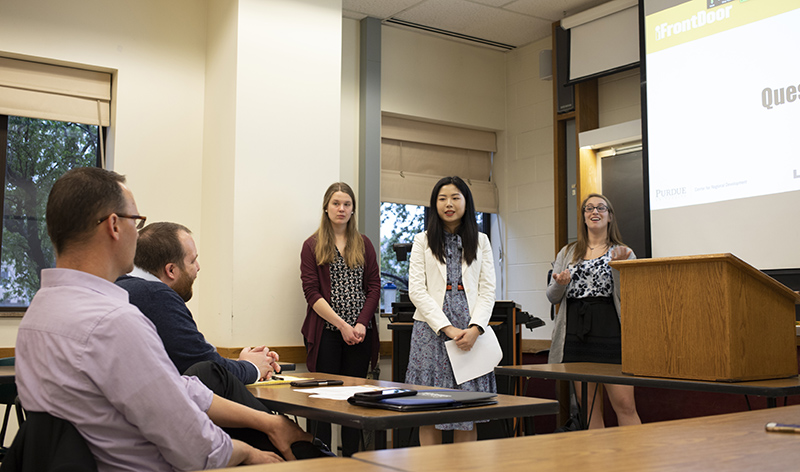
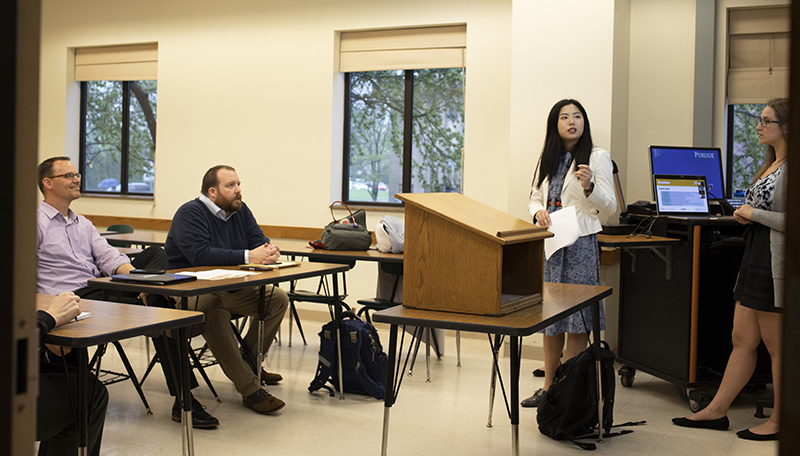
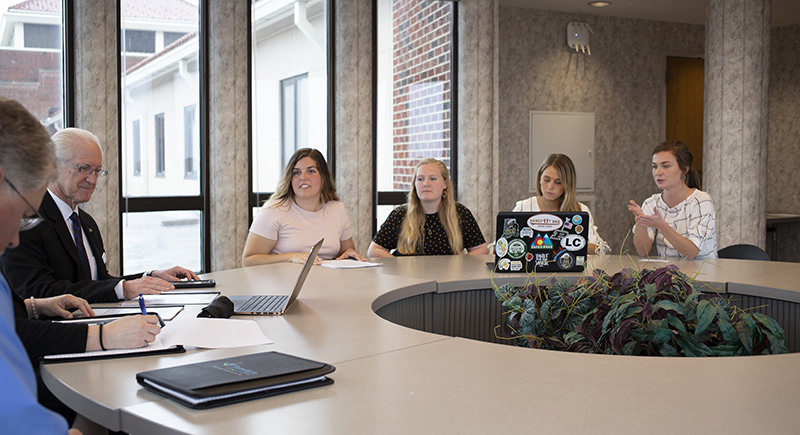
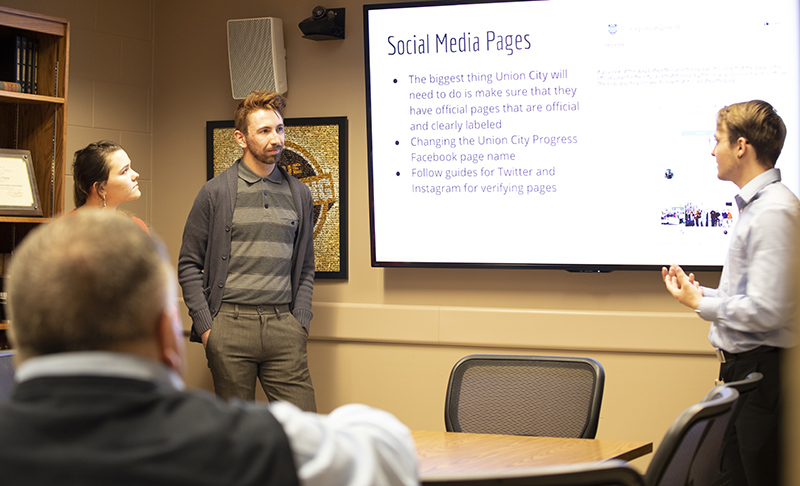
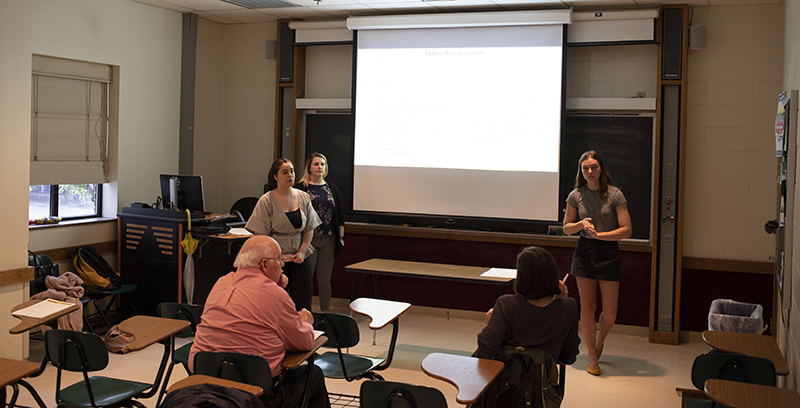
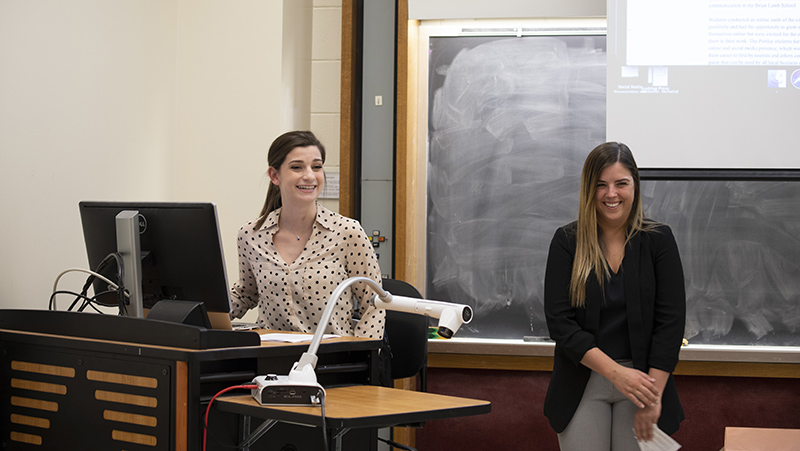
Spring 2019 iFrontDoor program. Images by Rachel Ravellette, Director of Social Media for the Brian Lamb School of Communication.
Communities must be willing to:
PCRD will evaluate the program along but not limited to the following lines:
 |
Improvement in online presence utilizing the assessment/audit as benchmark |
 |
Progress of communication plan implementation |
 |
Mid to long-term changes in behavior and outcomes |
If your community is interested to know more about the iFront Door program, please contact Jessica Wandless at jwandles@purdue.edu. Communities will be selected based on their agreement to the Community Expectations and on a first come first serve basis. We hope that in the future any interested community can apply through this website.
PCRD’s director, Dr. Roberto Gallardo, works with rural communities regarding digital inclusion and equity. In part, this work has included developing their online presence. Dr. Gallardo collaborated with the faculty and staff in Purdue’s Brian Lamb School of Communication and Agricultural Sciences Education and Communication to work with students in the communication field. Dr. Gallardo was part of the team that developed the concept and implementation when he was at Mississippi State University.
The Purdue version of iFront Door program launched in the Spring of 2019. It continues to evolve and develop as more communities and students participate. Ultimately, the long-term goal is for several communities to join together to create an internship and/or full-time position for student(s) from the communication class to become the online presence managers for a particular region. The student(s) hired into these position(s) will continue to manage and increase the communities’ online presence not only providing jobs for Purdue graduates but also helping retain youth in Indiana.

Jessica Wandless
Program Coordinator
Purdue Center for Regional Development
jwandles@purdue.edu
If your community is interested to know more about the iFront Door program, please contact Jessica Wandless.